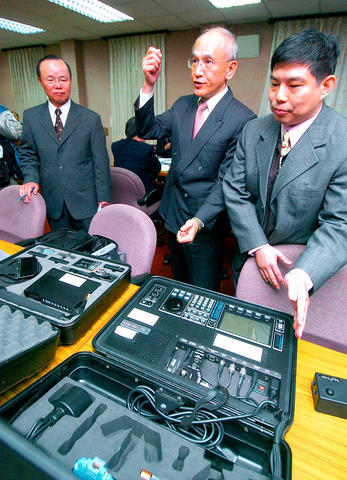National Security Bureau (NSB) chief Shi Hwei-yow (許惠祐) said yesterday that national security officials had not illegally monitored the opposition parties.
"Illegal monitoring violates criminal law and can lead to a maximum of five years in prison. I do not believe a government official would take such a risk," Shi told reporters at the legislature yesterday.
The Chinese Nationalist Party (KMT) has accused the Democratic Progressive Party (DPP) of misusing the nation's security resources to secure intelligence about a secret meeting between KMT vice presidential candidate Vincent Siew (

PHOTO: WANG MIN-WEI, TAIPEI TIMES
Shi said the accusations were groundless.
Siew allegedly warned Burghardt that the DPP was planning to destabilize the elections.
The meeting was not known about until last Friday when DPP Legislator Sandy Yen (莊和子) told local reporters that Siew and Burghardt had met for an hour on Dec. 8.
Chief of the Ministry of Justice's Investigation Bureau, Yeh Sheng-mao (
He told reporters at the legislature that his bureau did not illegally monitor opposition parties or their politicians.
He said the bureau only conducts monitoring related to criminal investigations and in cases were permission was granted by a judge.
Despite the NSB's denial, the pan-blue camp continued with the accusations. When approached by reporters, KMT Legislator Hung Hsiu-chu (
"Only the government authorities could conduct large-scale wiretapping using high-tech equipment," she said.
Calling the leak an example of "green terror," Hung said she felt horrified by the leak.
KMT Legislator Chiu Yi (
"It is a setback for democracy if [the government] did resort to wiretapping, stalking and manipulation of the opposition," he said.
When asked for comment, Legislative Speaker Wang Jin-pyng (王金平), a KMT member, said it was "possible" that the nation's intelligence agencies had resorted to phone tapping the KMT.
"We cannot say for sure because we are unable to identify the specific process [of the tapping], but wiretapping is really abused in Taiwan," Wang said. "If the accusation proves to be true, this would be a serious political incident."
Meanwhile, Ma's campaign office dismissed media speculation that the leak was an inside job.
"Leaks of internal documents have occurred before and we still do not know how ... we will continue to enhance our information security," spokesman Lo Chih-chiang (羅智強) said.
Premier Chang Chun-hsiung (
"You know, I personally have never done such a thing [eavesdropping]," he said.
Meanwhile, Chang was evasive about whether the administration would take legal action against the KMT in order to reclaim its stolen assets. He emphasized that the related government agencies were planning to take the necessary steps to deal with the matter, saying that he expected them to formulate an appropriate plan.
Chang said the DPP had encountered many difficulties regarding the recovery of the KMT's stolen assets, including several failed attempts to enact a law forcing the KMT to return its improperly acquired party assets to the nation's treasury.
Additional reporting by Ko Shu-ling

Beijing could eventually see a full amphibious invasion of Taiwan as the only "prudent" way to bring about unification, the US Department of Defense said in a newly released annual report to Congress. The Pentagon's "Annual Report to Congress: Military and Security Developments Involving the People's Republic of China 2025," was in many ways similar to last year’s report but reorganized the analysis of the options China has to take over Taiwan. Generally, according to the report, Chinese leaders view the People's Liberation Army's (PLA) capabilities for a Taiwan campaign as improving, but they remain uncertain about its readiness to successfully seize

Taiwan is getting a day off on Christmas for the first time in 25 years. The change comes after opposition parties passed a law earlier this year to add or restore five public holidays, including Constitution Day, which falls on today, Dec. 25. The day marks the 1947 adoption of the constitution of the Republic of China, as the government in Taipei is formally known. Back then the Chinese Nationalist Party (KMT) governed China from Nanjing. When the KMT, now an opposition party in Taiwan, passed the legislation on holidays, it said that they would help “commemorate the history of national development.” That

HORROR STORIES: One victim recounted not realizing they had been stabbed and seeing people bleeding, while another recalled breaking down in tears after fleeing A man on Friday died after he tried to fight the knife-wielding suspect who went on a stabbing spree near two of Taipei’s busiest metro stations, Taipei Mayor Chiang Wan-an (蔣萬安) said. The 57-year-old man, identified by his family name, Yu (余), encountered the suspect at Exit M7 of Taipei Main Station and immediately tried to stop him, but was fatally wounded and later died, Chiang said, calling the incident “heartbreaking.” Yu’s family would receive at least NT$5 million (US$158,584) in compensation through the Taipei Rapid Transit Corp’s (TRTC) insurance coverage, he said after convening an emergency security response meeting yesterday morning. National

Taiwan has overtaken South Korea this year in per capita income for the first time in 23 years, IMF data showed. Per capita income is a nation’s GDP divided by the total population, used to compare average wealth levels across countries. Taiwan also beat Japan this year on per capita income, after surpassing it for the first time last year, US magazine Newsweek reported yesterday. Across Asia, Taiwan ranked fourth for per capita income at US$37,827 this year due to sustained economic growth, the report said. In the top three spots were Singapore, Macau and Hong Kong, it said. South